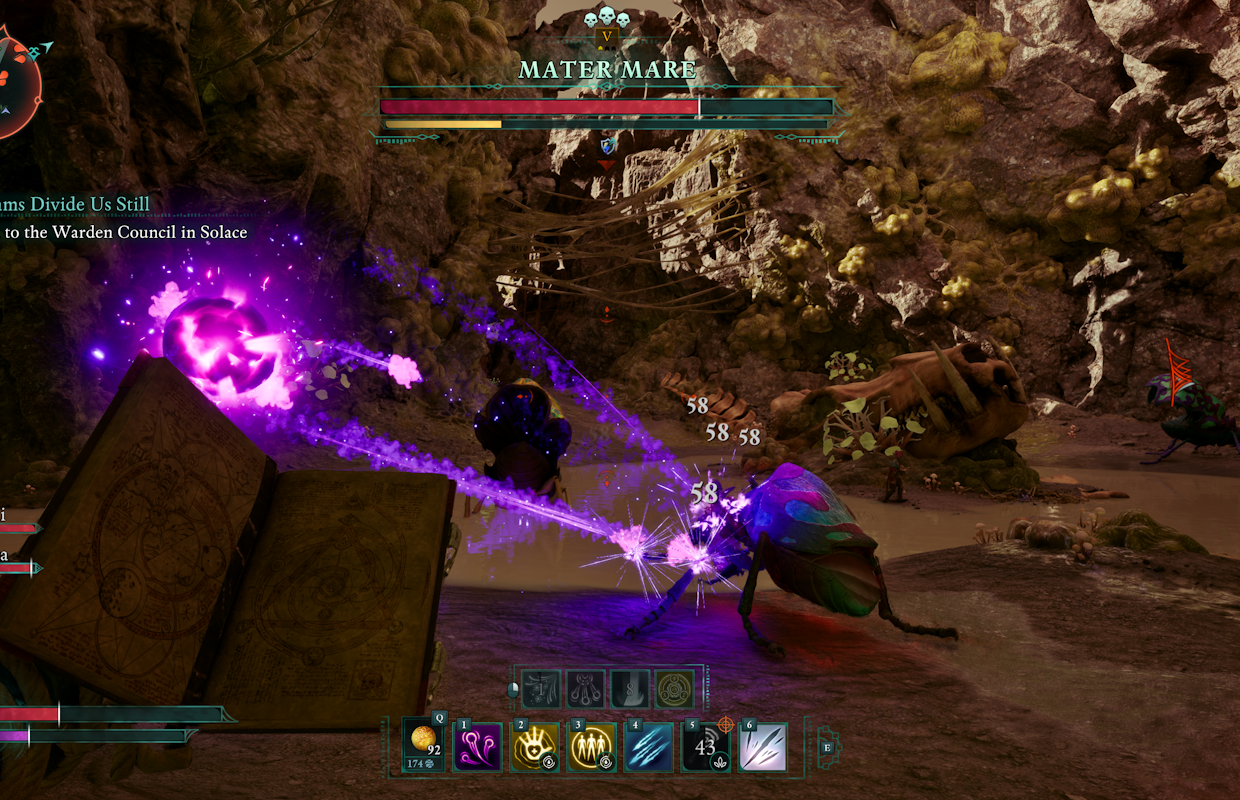
Approaching Avowed carried some baggage as I had high expectations due to my fondness for Obsidian Entertainment’s Pillars of Eternity, particularly the sequel, Pillars of Eternity II: Deadfire. The news that a new title was returning to the world of Eora took me by surprise. I appreciated Deadfire, but it faced commercial struggles despite critical acclaim. With Avowed being a first-person RPG set in the same universe and not Pillars of Eternity III, I was unsure if the events of the Pillars games would be rendered insignificant for marketing purposes or if they would still feel like part of a trilogy. I wasn’t certain about how it would turn out, nor was I sure about my own preferences regarding its direction.
Fortunately, what transpired exceeded my high expectations significantly. Even though it’s been a while since I last visited Deadfire after its initial release, starting up Avowed made me feel as if I was warmly welcomed back to a familiar and cherished place.
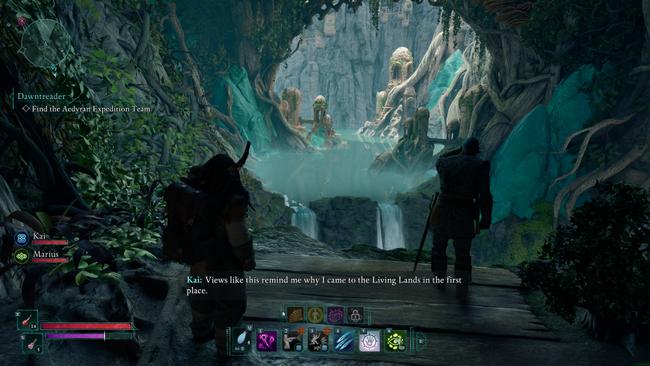
Avowed
Set several years following the events of Deadfire, this game unfolds in an autonomous part of Eora named The Living Lands. Players assume the role of a unique Godlike character, a group of individuals who physically embody one of Eora’s gods or goddesses from its vast pantheon. Despite not being directly linked to previous games, Avowed doesn’t shy away from referencing names, places, and past events. This immediate immersion in the standalone narrative was captivating for me, but it might be challenging for newcomers to the series due to the heavy dose of lore presented early on. The initial story introduction could be perceived as quite steep for new players.
Regardless of the path chosen, Avowed consistently delights me by immersing me in a vivid world that feels authentic and expansive beyond what’s immediately visible to the player. The game subtly references off-screen characters and locations, and casually mentions past events without laboriously explaining everything through long monologues. Instead, some aspects are left for the player to discover or infer, but this tradeoff creates a sense of belonging to something larger and more ancient, making it an enriching experience that often surpasses the main story in intrigue. In essence, Avowed’s lore and world-building are equally captivating, if not more so.
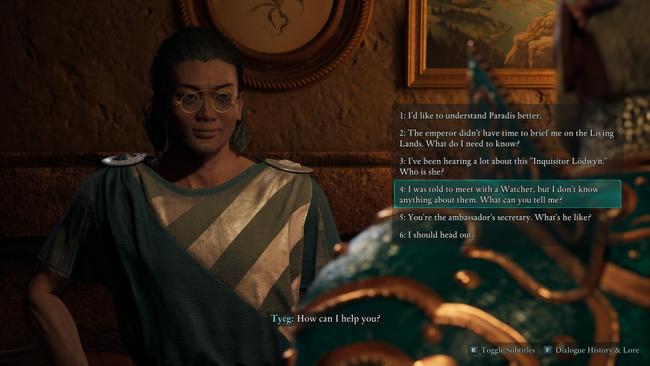
Initially, the narrative moves at a leisurely pace. The protagonist, endowed with divine-like abilities, is chosen to serve as an Ambassador for the Aedyran Empire. This role requires them to uncover the source of a perplexing affliction called the Dreamscourge. Their journey takes them to the Living Lands, where they face significant resistance due to the local inhabitants viewing the Aedyrans as an unwelcome, invasive force. The setting bears resemblance to that in the game Greedfall, where players find themselves in a difficult position of power.
In Avowed’s storyline, the main character starts experiencing a voice inside their thoughts, initially triggered only when they are near peculiar adra minerals in the area. Over time, this voice becomes almost like a second consciousness within the protagonist’s mind. The dynamic between the protagonist, the enigmatic voice, and the Dreamscourge form the heart of the game’s narrative development. The Steel Garrote, functioning as an adversarial Aedyran law enforcement unit, also poses a challenge. Early in the game, when the voice helps the protagonist avoid death, it sets off a complex interpersonal struggle that eventually puts the player in a situation to make decisions with far-reaching implications for civilization, culminating at the game’s climax.
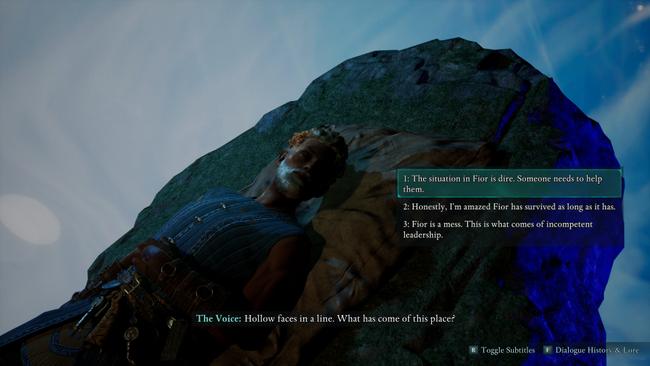
In both Pillars games, there was frequent criticism for their ‘dry’ nature, yet I found a similar undertone in Avowed that didn’t negatively impact my enjoyment. Instead, I became deeply immersed in the storyline, which is cleverly written, well-acted, and voice-performed exceptionally well. The pacing feels more like a documentary than an action film initially, but once settled, it seems fitting for the game’s world and setting. The companion characters are endearing and relatable, avoiding being defined by just one characteristic, making a brief summary challenging.
Kai struggles with his past and his nation’s aggressive tendencies, yet he often chooses not to dwell on personal regrets. In contrast, Marius is hesitant to discuss certain parts of his past and confront them, even when prompted. Giatta and Yatzli share complex relationships with Animancy and the enigmatic history of Eora’s “Godless” people, respectively. Despite having only four party members, each contributes significantly to the player’s interactions with the game world, offering multiple perspectives on the world of Eora as a whole.
In most Obsidian games, I’m accustomed to having faith in the quality of the narrative. However, what sets Avowed apart is the exceptional sense of exploration it offers. This game’s map is brimming with secrets, events, distinctive items, hidden caves, and grottos, as well as some substantial optional areas that resemble dungeons. Unlike many RPGs, where a vast map might be peppered with points of interest like cities or locations teeming with discoveries, there’s usually a lot of empty space between these interesting spots. In Avowed, though, I seldom walk a few steps without stumbling upon something that catches my eye, particularly in the initial zones.
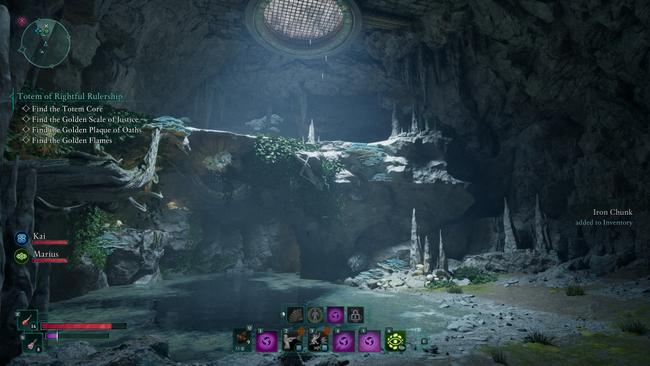
In Avowed’s game design, an ordinary “fog of war” effect is applied, making unexplored regions appear as a light mist while explored areas become clear upon traversal. The maps in this game are exceptionally crowded, and I soon realized that even the tiniest remaining fog on the map could conceal something I hadn’t found yet. While the last two of its four maps provide slightly more room, it’s still a tight squeeze. Each major region requires around 10 to 15 hours to fully explore. Although some have drawn early comparisons to The Outer Worlds, there seems to be much more depth to discover here.
In Avowed, each game area is brimming with various tasks common to the genre: bounties where players must vanquish minibosses scattered across the region, treasure maps that lead to secretly stashed treasures in hard-to-reach locations, optional battles, and the opportunity to uncover unusual and exclusive items or equipment. Each region also offers a variety of side quests that can sometimes intricately connect. Unlike The Outer Worlds, which had significant empty spaces between areas, Avowed’s regions are teeming with activities and seldom dull.
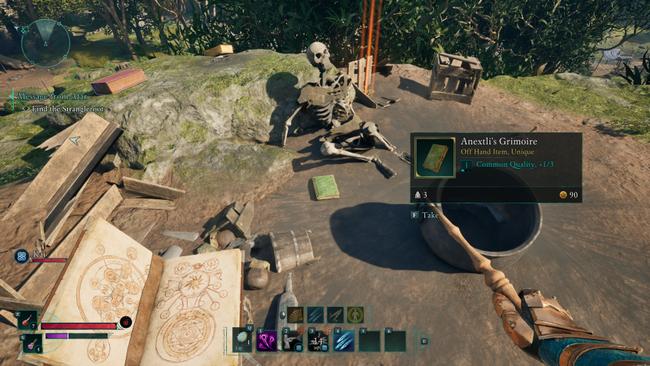
The degree of platforming within the exploration was an enjoyable and unanticipated bonus. Navigating towering buildings or traversing a labyrinthine network of caves felt intuitive after just a few hours. Often, secrets are concealed by requiring players to navigate in three dimensions. There are numerous environmental clues that assist attentive players in determining when and where to leap, such as hanging ropes, illuminated torches, or faint footprints, with minimal use of yellow paint for clarity.
Discovering every nook and cranny of Avowed brings about numerous benefits. To shed light on this, let me briefly discuss the gear system. In Avowed, you’ll find a standard selection of armor, weapons, boots, trinkets, and rings among other items. These gear pieces are ranked from tier I to V, with Legendary being the highest. This may seem commonplace, but what makes Avowed unique is that enemies too have their own rankings, ranging from I to V. Foes that surpass your current equipment will increase their damage output, while if you confront an enemy of a higher rank than your armor, you’ll experience a decrease in damage received. Even on the Normal difficulty, I frequently encountered foes at my level or above, and there was always a reason to keep all my gear updated.
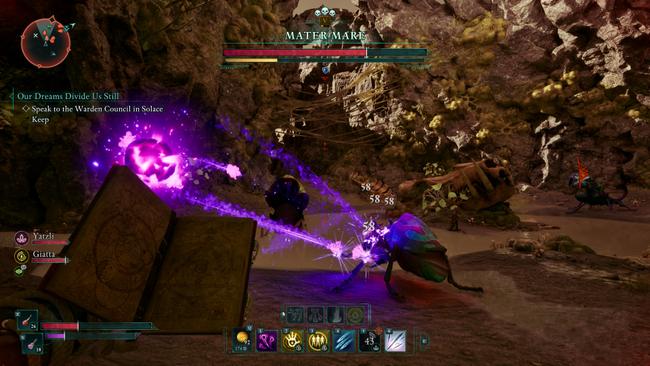
Engaging in this game can be quite intense at times, yet I found myself genuinely enjoying the experience. From the start, I opted to embody a character with magical inclinations, offering an intriguing system for spell grimoires and wand attacks. My character eventually evolved into a ‘glass-cannon’ type, which meant that I frequently had to adjust my position and find strategic advantages in combat to avoid being quickly defeated by just a few hits.
The game provides various skill trees, such as Fighter, Ranger, and Wizard, all of which can be chosen by any character. This has left me wondering about the unique hybrid builds players will ultimately create. Although I didn’t experiment with one myself, I did notice that the Fighter skill tree seems to have more passive abilities compared to the other trees, leading me to ponder whether those focusing on a physical build might feel slightly less captivated by the combat if compared to those using bows, guns, or magic.
As you move through the game’s four distinct areas, the difficulty of opponents will gradually ramp up – initially ranging from levels I to II in the initial area, then boosting to level III in the second area and so forth. This necessitated me either seeking resources (such as leather or metal) to enhance my existing equipment, or scouring for new gear of higher rarity. This leads me to my next point: Avowed boasts an impressive array of unique weapons, armor, and accessories, each with special abilities. Although it can be challenging to locate a piece of gear that suits a player’s desired build, every weapon and armor can be upgraded from tier to tier as needed. Therefore, even if a player finds their ideal sword fitting their playstyle in the first area and intends to stick with it, they will still be motivated to explore and gather materials for future regions to ensure that it remains statistically competitive.
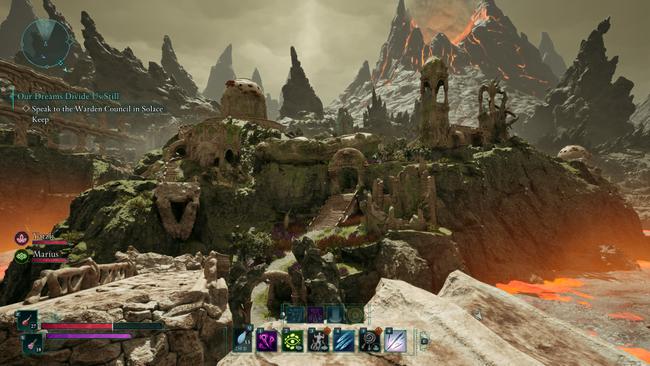
Effortlessly, Avowed manages to make the process of purchasing and selling gear, or stocking up on consumables, feel far from an afterthought. Occasionally, hard-to-find items could be purchased in shops, but I seldom had enough gold for everything I desired. Frequently, I found myself buying shop goods such as lockpicks and crafting materials to supplement what I discovered naturally, which was often scarce. I would often question whether it was wiser to dismantle unnecessary weapons for resources or sell them for gold. As a character who relied on spells, I actually came across one of my favorite wands in a shop that cost more than half my savings when I bought it. Although this sometimes left me uncertain about the best use of my resources and currency, I find it much more enjoyable than being able to afford everything (or nothing) without a second thought.
In various aspects, Avowed appears well-balanced, particularly in its emphasis on meticulous exploration. Typically, I approach most games by attempting to finish every side quest, delve into every cave, and more. However, despite my efforts to outlevel the game, I never felt overpowered. Instead, I frequently encountered situations where I was short on resources or found myself at a disadvantage against enemies who still held an advantage. This balance not only demonstrates the clever design of the open world but also ensures that each chest filled with even basic materials feels significant.
In other words, I found the challenge in this game quite engaging, but it makes me ponder how those who mainly focus on the main plot and occasional side quests might perceive it. Fortunately, the game offers different difficulty settings, from Story to Path of the Damned. However, it’s unusual for a game like this one, where being thorough doesn’t also make me feel overpowered compared to other players.
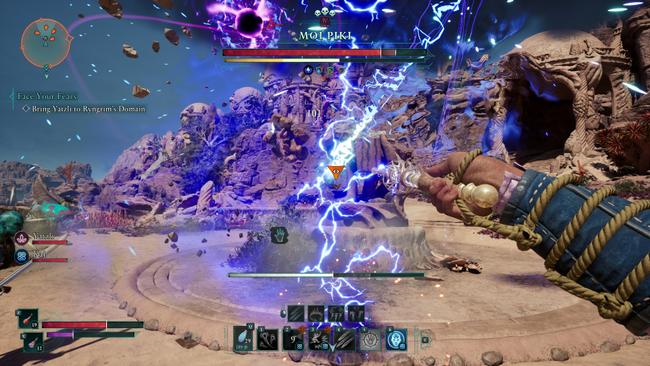
From an environmental perspective, I find the art style of Avowed quite appealing too. Initially, the gameplay unveiling received some mild criticism due to its cartoony appearance, vibrant hues, and slightly exaggerated dimensions. However, upon closer inspection, the final product aligns perfectly with the game’s world and narrative. The spells are visually striking, the ruins exhibit a sense of age, and the cities seem inhabited, all contributing to a harmonious whole where each element enhances the others.
In games where quests are involved, I particularly appreciate the subtle touches that showcase the ongoing life within the game world, even after a quest has been completed as recorded in the journal. For instance, early on in the first region, you might help an NPC share living quarters with a friendly Xaurip, an antagonistic lizard creature under normal circumstances. Later, if you explore the market area, you may discover this same NPC buying extra meat to feed her new roommate. There’s no specific prompt or reward for this encounter – it’s simply a detail that highlights how player actions can influence the lives of the game’s inhabitants, whether in small or significant ways. These types of interactions always keep me engaged.
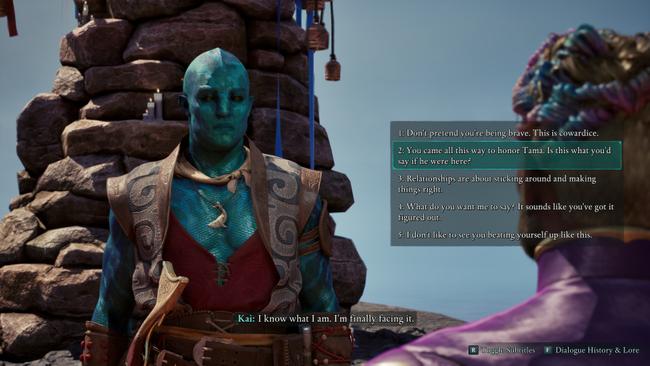
In one of the missions, you encounter two aged individuals seeking aid to relocate to the town of Thirdborn. Their request is for you to retrieve a lost land deed for their new home. However, it’s revealed during the quest that they are former convicts who were convicted of murder. They express their desire to start anew and leave their past behind. The quest presents a moral dilemma: either show compassion towards them or report them to the authorities. The predicament is set up in such a way that neither choice appears entirely justifiable. If you help them, you may later find them in Thirdborn. Interestingly, there’s no tangible reward for noticing their past, but it adds authenticity and continuity to the quest’s resolution. This style of quest design is common in Avowed, contributing to a rich, lived-in world atmosphere overall.
In some games, there are hidden tasks, or ‘micro quests’, that aren’t listed in your journal. For instance, a bartender asked me to check on the status of a shipment for her shop by speaking to another NPC. Without any arrow pointing the way, I managed to locate this person, reached an agreement, and received a small amount of gold upon my return. Another time, an NPC out in the world requested that I clear Dreamscourged zombies from near her husband’s grave. After finding them and defeating them, I watched her move over to pay her respects. Interestingly, she didn’t reward me for this task. This is not unusual in such games. At first, I questioned whether these interactions were glitches due to being so accustomed to tasks with progression leading to a reason or reward. However, in Avowed, many of these interactions are part of the overall narrative rather than just rewards.
Although the late-game decision wasn’t flawlessly carried out, it led to the unfortunate demise of characters from one of the main cities. I chose this path intentionally to explore the depth of the consequences, but it seemed that the choice had minimal or no impact on named NPCs, shops, or quests. This was surprising because the outcome was initially advertised as having significant weight. It felt more like a video game convenience than an immersive experience, leaving me with a sense of emptiness rather than the expected gravity.

Additionally, I encountered several glitches, such as some quests not functioning properly and enemies’ targets for bounties respawning prematurely. At one point, when trying to pick up an item from a fallen enemy, the item disappeared through the floor, necessitating a reload of my save file. Fortunately, the day one patch is intended to rectify numerous issues like these, so I find myself needing to be more cautious with my saved games in case any lingering glitches arise.
In summary, the critique is this: After a lengthy game that builds gradually like an unavoidable climax, the climactic payoff doesn’t seem as impactful as expected. There might have been several possible endings, and the one I encountered was just one of them. Regardless, by the time the credits started rolling, I felt underwhelmed.
In essence, Avowed stands out as a game where investment yields rewards. It’s not about waiting for it to become interesting after 20 hours, but rather immersing myself in intricate character interactions, captivating storylines, the harmonious blend of exploration and resource management, and the seamless integration of these elements that collectively enhanced my gaming experience. At its peak, Avowed is essentially a well-orchestrated combination of its meticulously designed components. However, occasional hiccups in execution slightly dampen the overall impression.
8
Versions tested: PC (Steam). Avowed is also available on Xbox Series X|S and Microsoft Store.
Read More
- Silver Rate Forecast
- Gold Rate Forecast
- Gods & Demons codes (January 2025)
- Honor of Kings returns for the 2025 Esports World Cup with a whopping $3 million prize pool
- Grimguard Tactics tier list – Ranking the main classes
- Superman: DCU Movie Has Already Broken 3 Box Office Records
- Mech Vs Aliens codes – Currently active promos (June 2025)
- Former SNL Star Reveals Surprising Comeback After 24 Years
- USD CNY PREDICTION
- Kanye “Ye” West Struggles Through Chaotic, Rain-Soaked Shanghai Concert
2025-02-14 09:27